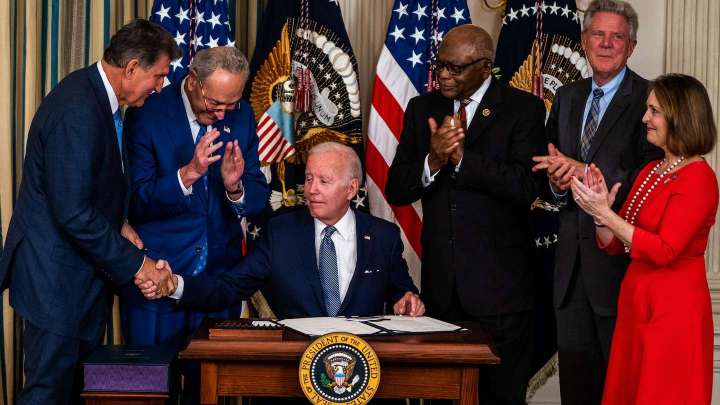Donald Trump’s latest turn in the spotlight is bad for Democrats — this time by drawing attention away from the Inflation Reduction Act. A lot is riding on the blockbuster bill, which Democrats hope will swing momentum their way ahead of the midterms.
How the Inflation Reduction Act will (or won’t) affect the midterms

The Inflation Reduction Act might not be a perfect bill. It doesn’t contain every new program Democrats promised last year. But it’s a good, important law. It includes the biggest investment in fighting climate change in U.S. history. It will prevent health-care premiums from spiking next year for 13 million people on Obamacare marketplace plans, and it should eventually put downward pressure on some prescription drug prices. Oh, and it might help you get your tax refund faster, because the IRS will finally have funds to bring its computer systems out of the Stone Age.
Over the long run, the law will improve the lives of regular Americans. But the emphasis here is on long run. If you’re expecting to notice any material improvement in costs or living standards before November, well, that ain’t gonna happen.
At least, not thanks to this particular bill.
Follow Catherine Rampell‘s opinions
FollowTake the climate measures. Even some of the subsidies that legally take effect soon won’t really be usable for a while. For example, the bill offers generous tax credits for electric vehicles, but an estimated 70 percent of EVs now sold in the United States will not qualify because of the bill’s material and assembly requirements. To qualify for the subsidies, auto companies must move supply chains out of not only China but also Japan, the European Union, Argentina and other manufacturing and mining hubs.
That will likely take years, assuming it happens.
And even if it does happen: The intended effects on emissions and ultimately climate change are also years away. These measures are very much worth doing, of course. But their effects will not be realized, or politically appreciated, for some time.
Likewise, the provision allowing Medicare to negotiate drug prices won’t kick in until 2026 — and then, for only 10 drugs. The marketplace premium provisions are about keeping an existing subsidy in place that was set to expire in 2023; so it will prevent premiums from getting more expensive, but it generally won’t lower costs from where they already are.
Will voters reward Democrats for not making things worse than they might otherwise be? I’m skeptical.
Then there’s the new law’s biggest promise, right there in its title: the pledge to reduce inflation.
The name “Inflation Reduction Act” was presumably chosen to get Sen. Joe Manchin III (D-W.Va.) on board. He had previously worried that Democrats’ spending package might push prices higher, as Republicans had claimed. Other Democratic lawmakers (and some economists) assured him that this latest iteration of the legislation, which shrinks deficits, would instead reduce inflationary pressures.
Realistically, though, the bill is likely to have little impact on inflation either way.
The Congressional Budget Office, Congress’s nonpartisan internal scorekeeper, has said that the bill would have a “negligible effect on inflation” in 2022 and that in 2023 it would nudge inflation somewhere between positive and negative 0.1 percentage points. Penn Wharton Budget Model, an independent research organization, estimated the bill’s inflation impact over the next decade as “statistically indistinguishable from zero.”
Now, Democratic politicians could get lucky. Gas prices have been sliding and could decline further by November. This would have pretty much nothing to do with the law, but voters are historically not great at attributing causality. Maybe they will assume cheaper gas is related to Democrats’ measure.
Meanwhile, other prices — rent, food — are still rising sharply. And there could yet be another unlucky shock that pushes gas prices up again. Assuming that Democrats will get credit for any falling prices, and not get blamed for any rising prices, is risky.
The biggest short-term political boost that Democrats can hope to get from the Inflation Reduction Act, then, will come from optics. A change in the “vibes,” as the kids say.
The bill’s passage is a symbolic point on the scoreboard for Democrats heading into the midterms; it shows they can deliver on big chunks of their (long-term) agenda. Maybe it can even change the narrative about Democrats’ competence or their reputed state of “disarray.” Its material benefits — much like those of, oh, Obamacare, a cautionary tale here — might not kick in for years, but perhaps the reputational assist will appear sooner.
But that can only happen if the bill, and its contents, breaks through public consciousness. For that to happen, Trump needs to be out of the headlines. And Democrats are kidding themselves if they think that will happen anytime soon — even if Trump himself might, for once, be okay with that outcome.






